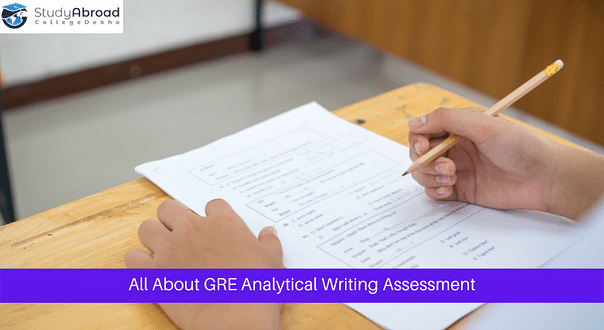Planning to sit for GRE? You should know how equally important it is to get good scores in the GRE Analytical Writing Assessment (AWA) section just like the GRE Verbal Reasoning section and GRE Quantitative Reasoning section. No matter if it doesn't add up to your composition score, however, mastering the test is vital as some universities give a lot of importance to the GRE Analytical Writing Assessment along with the composite score. So the students must prepare thoroughly for this section too.
GRE Analytical Writing Assessment Topics
This section of GRE is divided into two parts - analyse an issue and analyse an argument. However, from September 22, 2023, the "analyse an argument" task got entirely eliminated by the ETS, in addition, the total duration of the GRE General Test has been reduced to 1 hour and 58 minutes. Thus, the GRE test now only contains one task for which test-takers will get a total time of 30 minutes. Here is a brief breakdown of it:
Analyse an Issue
Under this topic, you will be provided with an issue to which you have to give or present your arguments with supportive examples. Students are required to answer this topic based on the instructions provided along with the question. The 'analyse an issue' topic aims to examine your ability to portray or present your views with adequate examples.
Planning to Study at Top Universities Abroad?
GRE AWA Score Evaluation
Based on its purpose, the students' write-ups are scored on a scale of 0 to 6. Six is the highest score which represents that the student has aced in articulated criticism of the argument. Whereas 0 is the lowest score that shows the student failed to meet the requirements of the GRE AWA section. The AWA section also has a 0.5-point increment system. The score is provided on an average of two topics, on a single scale.
Moreover, the scoring of the Analytical Writing Assessment section is generally carried by both human and computer grading systems. At first, the assessment paper is evaluated and scrutinised by a trained evaluator who analyses the Student's essay and scores him or her based on the overall quality of the answer.
After this, the essay then gets reviewed by Educational Testing Service's computer programme called 'E-Rater'. This computer-based checking helps to maintain standardized test scores, irrespective of different writing styles, patterns and knowledge backgrounds. However, in a rare case, if there's a huge gap between the marks evaluated by a trained evaluator and a computer, then the scripts would be again tested by a second human. Hence, the final scores are the average of both scores obtained by humans and computers.
GRE AWA Test Medium
The GRE Analytical Writing Assessment can be taken in both methods of test deliveries - computer-based and paper-based. If the student selects the technology medium to deliver answers, he or she then would be given a word processing tool, developed especially by ETS to conduct the test. The processing tool consists of deleting and inserting text, cutting, pasting and undoing commands. To remain fair with both the media, the processor has no grammar or spelling check feature.
On the other hand, If the student is applying for a paper-based test, he or she will need to ensure that their handwritten essays must be transcribed into the test booklets - containing the answers to the verbal and quantitative sections. Additionally, they will be required to write quickly and in clear handwriting. GRE AWA section has no word limit, however, it is still recommended to keep the essays short and to the point - a compact of your thoughts and arguments.
Why is GRE Analytical Writing Assessment Important?
Even if the section does not add up to the composite score obtained for GRE, it should not be treated with less importance. Different universities use this score to see the candidate's articulation skills, logical reasoning, critical thinking and writing.
If you're planning to study abroad, be prepared to write plenty of essays, research papers, thesis, etc. So make sure to concentrate on this section too. Practise sample questions so that you remain fully prepared for your tests.
Also Read:
GRE Analytical Writing Assessment - Preparation Tips
Almost every GRE AWA student wants to know some tips and tricks to ace this section. So, have a look at some time effective tips that may help you get a good score in GRE Analytical Writing Assessment:
-
Practise GRE AWA sample questions for both topics. Do not overlook the section and add it to your study plan.
-
Create a blueprint while studying. You may go for ETS AWA samples to make your essays.
-
Read sample essays on both topics by other students. This will give you an insight into what kinds of essays are generally favoured.
-
If required, brush up on your grammar skills. It is quite important to write a grammatically correct essay.
-
Read well-written essays as it will help you to understand the basic grammar techniques and construct sentences in your mind.
So now that we have gone through the major points on GRE Analytical Writing Assessment - including the medium and importance - we hope now almost all of your queries regarding GRE AWA has been resolved.
It is highly recommended to write quickly, however in neat and clean handwriting at the same time keep checking the time as you have only 39 minutes for each topic. Never remain overconfident as ETS recommends good writers to also practise and spend more time on preparing for GRE AWA.
If you have more questions and queries on GRE Analytical Writing Assessment, mail us at abroad@collegedekho.com for the best expert advice and suggestions.
Looking for More Helpful Tips on Preparing for GRE Analytical Writing Assessment?
























